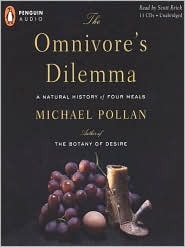
The Omnivore’s Dilemma: A Natural History of Four Meals by Michael Pollan
My rating: 5 of 5 stars
What does ‘organic’ really mean?
Is intensive agriculture sustainable in the long run, or will people starve when oil becomes scarce?
How does man’s legacy of hunting and gathering jive with contemporary vegetarian and vegan movements?
How does ‘ethical’ stack against ‘local’ or even ‘cheap’?
How is it that people spend the tiniest percentage of their income on food ever? What went wrong and people started to make cuts on food and health?
If every technological advancement requires a sacrifice in the name of progress and the promise of a better quality of life, what exactly has been sacrificed in the name of the promise of abundant burgers and potato chips, in a world that’s never been as saturated in cheap, empty calories?
Where does food inequality come in, when just the rich can afford quality, organic, local food?
Is expensive, quality food elitist, and if so, does securing cheap food prices produce a net social benefit, if that necessarily means a drop in quality?
I was inspired to give this book a listen after watching this talk by the author Michael Pollan. After having read the book, I think it sums up its main points in an effective and engaging way.
I have to give it to Mr. Pollan. His combined skills in investigative journalism, philosophical musings and story-telling made his style very convincing: he went from the personal to the universal extremely seamlessly and I was there listening as if under a spell — no easy feat in non-fiction. Considering the topic is as important and relevant as food, his ability to make the science approachable and the public aware of these deceivingly complex subjects really counts for a lot. He really drives home that it’s not just about collecting the data, it’s about making sense of it, finding the points of convergence and creating a narrative. It’s perhaps one of the skills data-bloated people in the 21st century will struggle with the most.
The Omnivore’s Dilemma was so well-argued, it even made me question my own vegetarian/vegan diet and its ethical subtexts, forcing me to re-evaluate the reasons I have actually chosen this path, as much as it would challenge any carnivore going in with an open mind (even though I find it hard to believe any carnivore, not just open-minded ones, would be able to rationally argue against Mr. Pollan’s case about factory farming and agriculture). It went down to the very roots of the problem of modern, numbers-first food-growing, touching on anything and everything relevant to what’s going on behind the scenes, ‘what they don’t want you to know’.
I was between giving it four and five stars because the information is rather old by now and it’s quite American-centric, so as a European I was left wondering what the state of affairs in the EU, or even in Greece, is. But then I remembered that, at least until Trump became president of the US, most of the developed world was trying to maximise ‘market freedom’ and loosen regulations, trying to mimic the late-stage capitalist model of the US.
Maybe in the last 10 years since the book was published we’ve all grown a bit more jealous of poor, sick, undernourished Americans, and are more willing to trade in our health for cheaper chicken souvlaki. We might not nearly use as much corn around here, but If I look at it that way, The Omnivore’s Dilemma was predicitive of what was to become the global state of affairs, so how can I give it 4 stars for ‘just’ focusing on America?
